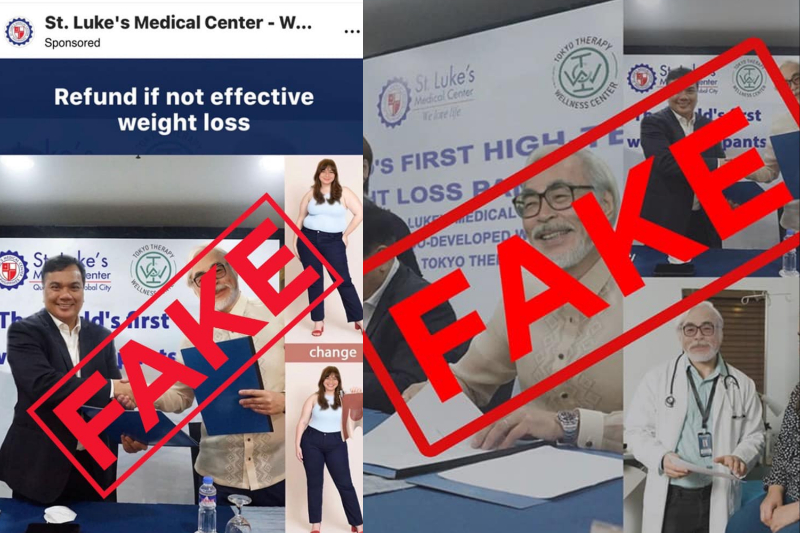CLAIM: A social media page bearing the name of St. Luke’s Medical Center and that of a renowned Japanese animation director is offering weight loss products to the public.
The Facebook page is called St. Luke’s Weight Control Center. Its display photo also bears a logo that reads “St. Luke’s Hospital.”
It circulated a post about a supposed pair of high-tech weight-loss pants, citing the use of “quantum technology.”
It also used the name Hayao Miyazaki, acclaimed Japanese animator and co-founder of Studio Ghibli, in its weight loss advertisement.
“Dr. Hayao Miyazaki from Tokyo Therapy and Wellness Center (Japan) in cooperation with St. Luke’s Medical Central, supporting the cost of treatment for the first 800 Filipinos to lose weight safely and effectively with high-tech machines,” reads the post.
“The world’s first high-tech weight loss pants. It will use the world’s first quantum technology weight loss pants. Two chips on the pants will emit quantum waves to shrink the stomach to reduce the feeling of hunger. At the same time, burn fat gradually. You will find that your belly is warmer than usual,” it further reads.
Moreover, photos of an individual resembling and posing as Miyazaki also accompanied this advertisement.
RATING: The social media post and account bearing the name of St. Luke’s Medical Center are fake.
Facts
St. Luke’s Medical Center disowned this post and the account that circulated it. The private institution released its statement last March 18.
“St. Luke’s Medical Center warns the public about fake social media pages and accounts created by entities who purportedly claim to be associated with our hospitals. In order to know the full list of St. Luke’s doctors, products, promos, and services, we advise the public to check our official website and Facebook page,” its advisory reads.
In its post, St. Luke’s management also attached screen copies of the circulating fake Facebook post with a “fake” label across them.
The private institution further asked the public for help to report to them other similar accounts and pages that make similar claims on social media.
“Let us take part in keeping our community of patients and healthcare providers safe and free of scams, unlicensed practitioners unsound medical advice, and unregulated medicines,” St. Luke’s said.
“Appropriate actions will be taken against pages and individuals attempting to use the St. Luke’s brand, logo and reputation for their exploitative activities,” it also warned.
The official logo of St. Luke’s Medical Center is also different from the one used in the Facebook post.
This is seen in the private hospital’s Facebook profile photo. Its two locations, in Bonifacio Global City in Taguig City and in Quezon City, are also showcased here.
Why it matters
The fake advertisement can still be viewed on Facebook as a sponsored post despite the warning from St. Luke’s Medical Center against it a month ago.
So far, it has 65 reactions, 29 comments and 1 share.
In the comments section, Facebook users shared sketchy photos of themselves as proof of the supposed effectiveness of the product the Facebook entity is selling.
This story is part of the Philippine Fact-check Incubator, an Internews initiative to build the fact-checking capacity of news organizations in the Philippines and encourage participation in global fact-checking efforts.
Interaksyon is part of #FactsFirstPH, a multi-sectoral initiative promoting truth in public space and demanding accountability for falsehoods. For those interested to join the initiative, email info@factsfirst.ph
Interaksyon is also a founding partner of Tsek.ph, a collaborative fact-checking project for the 2022 Philippine elections. It is an initiative of academe, civil society groups and media to counter disinformation and provide the public with verified information.

